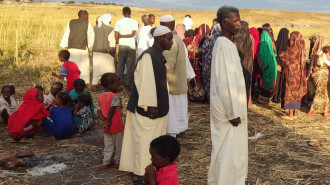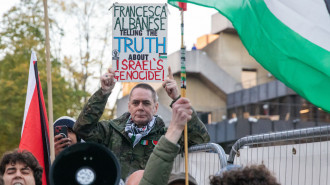Fight or flight: Yemenis stuck between war and refuge
A deteriorating security crisis, as well as an ongoing aerial bombing campaign, is causing residents to choose between fleeing for safety or remaining at home.
Among these is Sami al-Zubaidi who was forced to part with his family after fleeing Sanaa in a bid to find safety on the outskirts of Hodeidah, a coastal city on Yemen's western coast.
Despite the harsh conditions in Hodeidah, al-Zubaidi described their new area as safer than Sanaa, where "random eruptions of armed conflict on the streets are a matter of life and death".
"My family is currently residing in our old house in Hodeidah despite the scarcity of water, food and excessive power cuts. It is certainly much better than staying in Sanaa where you are exposed to continuous aerial bombardment," he said.
Unable to leave his job or their family home unaccompanied, al-Zubaidi has been living alone since April when his family left due to an intensification of the Saudi-led coalition bombing campaign.
But he says he has considered reuniting with his family in their Sanaa home in recent months "whenever the situation calmed down".
 |
My family is currently residing in our old house in Hodeidah despite the scarcity of water, food and excessive power cuts. It is certainly much better than staying in Sanaa where you are exposed to continuous aerial bombardment |  |
"I feared bearing the burdens of bringing them back – the cost of transportation – only for further escalation to erupt again," he said, poignantly reminding the world that "the danger is not over yet".
Over 2.7 million Yemenis, an astounding 10 percent of the population have been forced to leave their homes, according to statistics from the United Nations.
However, Khaled al-Baadani and his family – like thousands of others – are forced to remain in their homes regardless of the challenges imposed on them.
"We sought refuge in Ibb at the start of the war but were unable to stay because we didn't have our own home," he told The New Arab.
"We had no choice but to return to Sanaa two months later after the Saudi-led war on the Houthis was officially launched in March."
But al-Baadani says they have become accustomed to the sounds of war, explosions and the lack of amenities available to do them.
Like thousands of other Yemenis, armed clashes and street conflicts are no longer a cause of concern.
 |
Baadani says they have become accustomed to the sounds of war, explosions and the lack of amenities available to do them |  |
However, the same cannot be said about the lack of basic food supplies.
The capital's population is buying essential food items such as wheat, rice, oil, sugar and canned food in bulks for fear of another war.
"I believe whatever happens to us has been ordained by God, but I store two months' worth of food at home in the event of an emergency," said Sanaa resident, Mohammad Nomani.
UN figures show almost half of the estimated 6,000 killed in the conflict since March were civilians – of these 700 of which children.
Figures quoted at a UN Security Council meeting set up to discuss the ongoing crisis in Yemen suggested the total number of those killed and injured is 35,000.
Under-Secretary-General for Humanitarian Affairs, Stephen O'Brien said 14 million Yemenis, including two million children, are suffering from serious malnutrition.





 Follow the Middle East's top stories in English at The New Arab on Google News
Follow the Middle East's top stories in English at The New Arab on Google News


